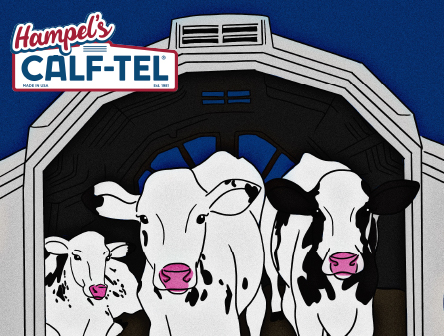By Grace Kline

Dairy farmers can be very stubborn. I say this because my grandfather was a stubborn dairy farmer, along with my dad, my husband, and myself on occasion. To be a good dairy farmer, it takes a good bit of stubbornness. I mean, how else are you going to get yourself out of bed at 4:30 every morning, determined to take on another day – no matter what it throws at you?
At the same time, stubbornness can let you fall behind. For years, farming traditions have passed through many generations, teaching the same techniques. My grandfather taught my father how to farm, and my father taught me. I’m sure many of you can say the same. The other thing I can say is that I have had many opportunities to work away from our herd and learn new things. New is not always better, and may not always work for your farm, but you don’t know unless you try. I was grateful that my father let me implement new techniques when I came home from different jobs and internships, and we played trial and error with many things. Those experiences made me the farmer I am today.
Change can take an emotional toll on some farms, while on others it simply takes a toll on logistics. However, we will be taking a look at how our brains view change to better equip ourselves for the future.
At the Northeast Dairy management Conference in Liverpool, NY, an article from The Human Factor by Holly G. Green was featured when discussing change in the workplace. The article was titled “Adapting & Thriving in an Ever Changing World: Using Your Brain to Win.” The first concept to understand when discussing change, according to Holly, is that “we are pattern seeking, structure loving animals.” We know this to be true about farmers because we often hear them say something like “we’ve always done it this way.” We form habits and routines, often doing just about the same thing every day, whether it is beneficial or not.
The next concept from Holly is to be aware of your brain in unexpected changes. She writes of 6 phases we tend to go through when confronted with the unknown. Not everyone goes through every single phase, but try to find which ones you connect to the most. The first phase is shock. If it is something small we may think of it as curiosity, however large changes will be shocking and unsettling. The second phase is denial, which consists of “looking for evidence it is not true or won’t affect me.” Both the second and third phases resonate with me the most, because I know that they are exactly how I react when I am confronted with change. I immediately try to find a way that it will not work, or that what I am hearing cannot be true. That being said, the third phase is a stage of annoyance or frustration. When faced with the unknown, we put up a mental wall (like a stubborn farmer) and refuse to accept the new concept. For some, change can bring about a lack of motivation, lack of energy, or depression as stated by Green. “We withdraw, disconnect.” We try to reason that avoiding the subject may make the issue go away, or at least we will not be dealing with it directly.
The final two phases can be the most difficult ones, but they are the most positive. The fourth phase is acceptance and the beginning of experimentation. I mentioned earlier that my father sounded similar to this fourth phase, but that is not to say that our family always operated that way. It took some time for us to learn to communicate to achieve the acceptance phase. When proposing new ideas, it is important to consider your audience and the work they have done both with you and for you in your dairy operation. Highlighting what is working and appreciating those doing the work may make your team more receptive to new ideas. Take time to learn the communication strategies of those around you, so that you are better equipped to introduce new ideas and get a more accepting response.
The final phase is integrate – working “with the new parameters/situation, become more positive.” Patience is key when working to the integrate stage. We can always fall backward and try to reject the idea even after we’ve convinced others that we have accepted it. Green highlights that a change in perspective can be helpful for all parties, asking ourselves “what if I was in their shoes? How do these options compare, my feelings aside?” It is important to take a step back and examine the whole picture, gaining control of our own minds by making an honest assessment of the changes being brought before us. You can let these changes tear your team apart, or you can use them to bring your team closer together through learning, acceptance, experimentation and integration.
Managing change is as much of a struggle in our minds as it is out in the barn. Taking control of your own mind and recognizing your resistance to change can open you up to experimentation discussions faster with less frustration. Technology is constantly changing the way we do things because we are able to learn more about different subjects and do a better job taking care of our cattle.
We should view change as a way to grow and better ourselves, rather than a disruptive force that is harming generations of hard work. My grandparents love visiting our farm and marvel at the technologies and set ups we get to work with, and it is fun to share with them.
Green, Holly G. Using Your Brain to Win. The Human Factor, 2013.
Grace Kline operates Diamond Valley Dairy with her husband Jacob, and brothers-in-law Josh and Jesse Kline. Grace is the calf and heifer manager, working on the farm full time. She graduated the State University of New York at Morrisville with a Bachelor’s degree in Agricultural Business Development in 2021.
